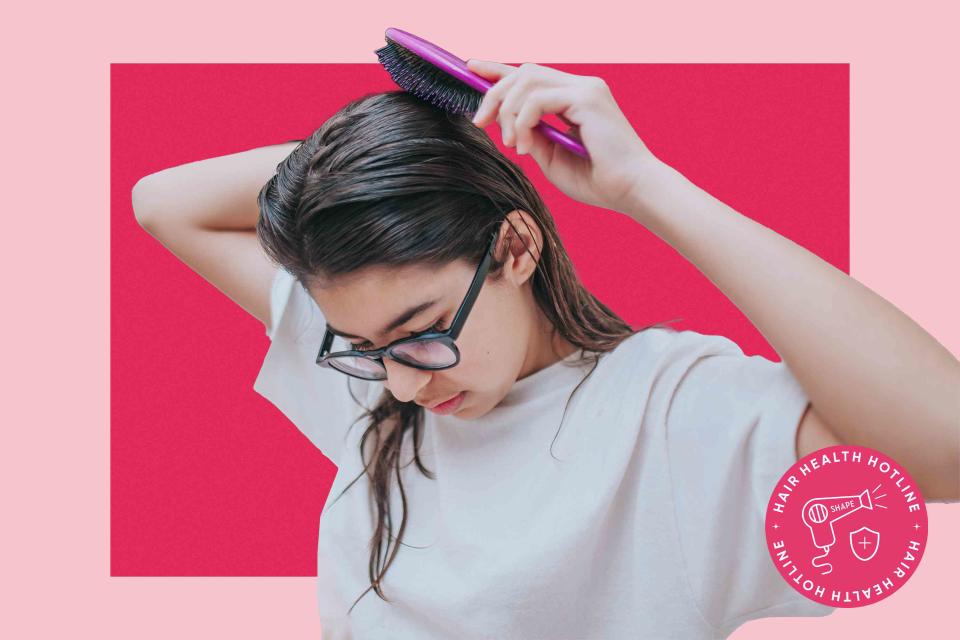This Daily Habit May Be Damaging Your Hair — Here's What To Do Instead
Brushing wet hair after a shower may seem harmless, but you may want to rethink this part of your haircare routine.

Getty Images
Hair Health Hotline is your direct access to dermatologists, trichologists, hairstylists, and other beauty pros. Each story in this series tackles a common hair or scalp concern and offers science-backed solutions to care for your strands.
Hair is most people's biggest defining asset—a personal emblem of style and personality— if you will. Nurturing it involves swimming through an ocean of information, a multitude of suggestions from a plethora of sources—be it your best friend's secret hair potion recipe, the latest on-trend hair care line endorsed by your favorite influencer, or a ton of blogs and vlogs offering solutions to every hair problem known to man.
Amidst this swirl of advice, one warning often stands out—"Never brush your hair when it's wet!" Is there any truth behind this cautionary tale, or is it just another beauty myth designed to complicate your haircare routine further? Are you actually damaging your locks by brushing your hair when wet? Luckily for you, we tapped into celebrity hairstylist Bradley Leake, an expert in the realm of hair care, to help sort through these tangled claims.
Q: I've always brushed my hair right out of the shower, but lately, I've heard this might not be the best idea. Is brushing hair when wet potentially harmful?
A: Contrary to your habitual post-shower grooming routine, Leake suggests reconsidering our methods. The seemingly harmless act of brushing wet hair, he suggests, might be a secret saboteur to your hair's health. The core of the issue lies in the state of your hair when wet—it's more flexible and more prone to being manipulated in ways it wouldn't when dry, leading to potential damage.
Imagine your hair like an elastic band—it has a certain limit to how far it can stretch before it gives in and snaps. Wet hair, Leake explains, behaves similarly. It's more flexible, stretchable, and hence, more susceptible to breakage when brushed. This seemingly innocent routine of brushing wet hair might be silently straining your strands, leading to unintended damage. However, it all depends, as we'll further explain.
Does Hair Type and Texture Matter When Brushing Wet Hair?
Much like most aspects of beauty and personal care, the "one-size-fits-all" approach doesn't hold water here (pun intended). The damage potential of wet brushing varies significantly across hair types and textures, as Leake further explains. "Certain hair types are much more prone to damage with wet brushing, while others can tolerate it without issues. Wavy to curly to coily hair typically do well with wet brushing, whereas straighter, coarse or fine hair is more vulnerable and will wind up snapping and breaking if brushed while wet", clarifies Leake. For wavy and curly locks, wet brushing has advantages, such as fighting frizz and aiding in the definition.
So while some hair types and textures should avoid brushing wet hair like the plague, others, such as curly or coily hair types, get the green light as the combination of wet hair and maybe even a leave-in with a ton of slip could make the detangling and brushing process smoother, literally and figuratively.
How to Minimize Damage
Even if you decide to continue brushing your hair when wet, armed with some knowledge and a few changes in technique, you can minimize the potential harm. Leake's advice starts with tools. The right tools can make all the difference in your hair care routine. He recommends beginning with finger combing and moving onto wide-toothed combs for those who need to detangle wet hair, which can significantly reduce the risk of breakage. Whether you're using a brush, comb, or fingers or brushing dry or wet, the most important thing to do is to work through knots and tangles from the bottom up—never yank through your hair from roots to ends, as this will lead to unnecessary breakage.
But it doesn't stop with the tools—the technique also plays a significant role. Leake suggests a smart trick—apply a detangling spray or a leave-in conditioner before brushing. These products can help the comb glide smoothly through your hair, avoiding unnecessary strain and tension. Additionally, general good hair care practices can mediate any potential damage. Leakes suggests working hair bonding solutions (such as the Epres Bond Repair Treatment) into your haircare routine to arm your locks against damage from elements such as heat and physical manipulation from brushing.
Taking a step back, we can see that the answer to the question, "Is brushing your hair when wet bad?" isn't as straightforward as it may seem. According to Leake, the answer is nuanced, dependent on variables like hair type, tools, and technique. As with all aspects of personal grooming, understanding the method behind the madness is key. Be gentle with your hair, recognize its specific needs, and adapt your routine to cater to these requirements.
If uncertainty persists, follow Leake's sage advice—when in doubt, brush it out...before your shower. In general, knowing and caring for your hair appropriately is the first step to nurturing its health and beauty.
Related: The 8 Best Foods for Healthy Hair, According to Dietitians
For more Shape news, make sure to sign up for our newsletter!
Read the original article on Shape.

